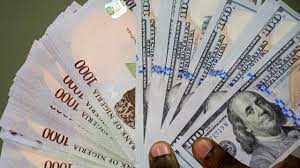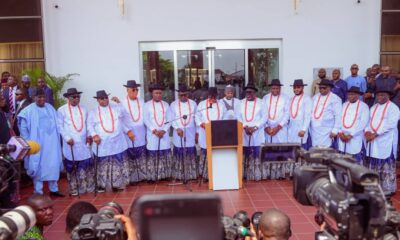Business
CBN Explains Depreciation In Naira’s Value

The Deputy Governor, Corporate Services Department of the Central Bank of Nigeria (CBN), Mr Edward Adamu, has attributed the depreciation in the value of the Naira to the effects of the Covid-19 pandemic on the economy.
Adamu stated this at an interactive session with the House Committee on Finance on the 2022-2024 Medium-Term Expenditure Framework/Fiscal Strategy Paper (MTEF/FSP) in Abuja on Monday.
He explained that the exchange rate was determined by the forces of demand and supply and that there were three main avenues by which Nigeria got its foreign exchange.
“We have proceeds from the sale of crude oil, we have foreign portfolio inflows and remittances; those are the three major ways that we get forex.
“Crude oil sale has not been as high as we all will want it to be and obviously in the aftermath of Covid-19, the global economy grounded to a halt and the use of crude oil was also halted.
“To the extent that sometimes in April last year, we had crude oil selling at a negative, which means that people were being paid to store what they bought and so that the avenue for forex inflows was significantly reduced.
“You go on to foreign portfolio inflows, you notice that investors also settled their affairs on the side of caution and so, once Covid-19 outbreak occurred, they moved out about $120 billion dollars from emerging markets to safe havens in America and Nigeria is one of those countries from where monies were withdrawn.
“On the side of remittances, once our brothers and sisters abroad were not working because of the situation they found themselves; they had very little to send to us here and so, we also saw remittances reduced.
“On the demand side, we saw speculative demand on the side of Nigerians, if you needed a truck of goods, because you are not sure of the uncertainties of Covid, you wanted to get three trucks.
“All these pressures on both the demand and supply side, the availability of dollar became more difficult and we had a decline or depreciation in the value of the naira,’’ he said.
Adamu, however, said that a lot of efforts within the CBN and the recovering global economy were helping oil prices and remittances to recover.
“This is why we are happy that the exchange rate has stabilised somewhat; it is a moving target, but it has stabilised in the import and export window for a while”, he added.
However, the Chairman of the committee, Rep. James Faleke (APC-Lagos) directed the CBN to present its audited account to the Office of the Accountant General of the Federation (OAGF) for scrutiny.
Faleke said that information available to the committee showed that the apex bank was yet to turn in its audited accounts since 2010 and about N800 billion was yet to be remitted to the Federal Government.
Adamu responded by saying the apex bank would interface with the OAGF and reconcile any difference there was and report to the committee in two weeks, through the Minister of Finance.
Business
PETROAN Accuses Crude Oil Producers Of Diverting 500,000bpd Refineries-Bound Product
The Petroleum Products Retail Outlet Owners Association of Nigeria (PETROAN) has alleged that oil producers were diverting 500,000 barrels per day (bpd) of crude oil intended for local refineries.
The claim was made public on Wednesday amid ongoing discussions about the challenges facing Nigeria’s refining sector.
The association’s publicity secretary, Joseph Obele, who made this known, emphasised that the diversion of the crude allocations has led to the abandonment of many refineries, which were struggling to operate due to insufficient feedstock.
Obele accused oil producers of prioritising quick foreign exchange gains over compliance with domestic supply obligations.
The PETROAN spokesman commended the Nigerian Upstream Petroleum Regulatory Commission (NUPRC) for recently banning the export of crude oil allocated for domestic refining, a move they believed will enhance local refining capabilities and reduce the nation’s reliance on imported petroleum products.
He said, “Approximately 500,000 barrels of crude oil per day are allocated for domestic refining, but these volumes often find their way to the international market”.
The situation has prompted calls for immediate action against both producers and companies that fail to adhere to the new regulations.
The issue has sparked a heated debate among industry stakeholders. While oil producers argue that local refineries often do not meet commercial terms, refiners counter that producers are neglecting their supply commitments in favour of international markets.
This ongoing blame game complicates efforts to stabilize local crude supply and improve refinery operations.
PETROAN’s national president, Billy Gillis-Harry, urged swift enforcement of the export ban to ensure that local refineries receive their fair share of crude oil.
He expressed optimism that this policy could lead to a more self-sufficient refining sector in Nigeria, ultimately benefiting consumers through reduced prices and improved product availability.
Business
FG Targets Reduction In External Borrowing
The Federal Government has said it is committed to reducing reliance on external debt financing and promoting private sector-driven economic growth as part of its strategy for long-term fiscal stability.
The Minister of Finance and Coordinating Minister of the economy, Wale Edun, who made this known during a meeting with World Bank executive director, Dr. Zainab Shamsuna Ahmed, emphasised Nigeria’s shift towards alternative financing sources and investment-friendly policies.
He acknowledged the World Bank’s role in Nigeria’s development but stressed that the government is prioritizing a business-friendly environment to encourage private-sector investments.
“Our focus is on reducing dependency on external borrowing while ensuring that Nigeria’s economic policies foster long-term, private-sector-led growth”, he stated.
In his response, Dr. Ahmed, who previously served as Nigeria’s Minister of Finance, commended the country’s ongoing macroeconomic reforms, which she said have boosted fiscal stability and investor confidence.
Ahmed also noted the World Bank’s recent financial reforms, which have increased its lending capacity, making an additional $150 billion available over the next decade.
A key highlight of the meeting was Nigeria’s role in “Mission 300”, the World Bank’s initiative to provide electricity access to 300 million Africans.
Edun reaffirmed that power infrastructure remains a top priority for the government, as it is critical to economic growth, industrial expansion, and private-sector competitiveness.
“Electricity access is a game-changer for Nigeria’s economy, and we are committed to playing a leading role in Mission 300 to ensure sustainable development”, he said.
He further emphasised that President Bola Tinubu remains dedicated to strengthening Nigeria’s economic foundation, shifting away from external borrowing, and fostering a resilient, investment-driven economy.
Business
Dangote Refinery Exports Jet Fuel To Saudi Aramco
Dangote Petroleum Refinery had exported two jet fuel cargoes to Saudi Aramco, the world’s largest oil producer and a leading integrated oil and gas company globally.
Saudi Aramco is a majorly state-owned petroleum and is the national oil company of Saudi Arabia.
President of Dangote Group, Aliko Dangote, disclosed this during a visit by a team of the Nigerian Economic Summit Group (NESG) to both Dangote Fertiliser Limited and the Dangote Petroleum Refinery & Petrochemicals in Ibeju Lekki, Lagos.
He said exporting products to the global markets, especially Saudi Aramco, was because of his refinery’s world-class standards and advanced technology.
“We are reaching the ambitious goals we set for ourselves, and I’m pleased to announce that we’ve just sold two cargoes of jet fuel to Saudi Aramco”, he said.
According to him, since it began in 2024, the refinery has steadily increased its output, reaching 550,000 barrels per day.
While commending Aliko Dangote for establishing the $20 billion refinery – the largest single-train refinery in the world – NESG Chairman, Mr. Niyi Yusuf, stated that Nigeria needs more investments of this calibre to reach its $1 trillion economic goal.
“To achieve a $1 trillion economy, much of that must come from domestic investments. I joked during the bus ride that while others are dredging to create islands for leisure, you’ve dredged 65 million cubic tonnes of sand to create a future for the country.
“This refinery, fertiliser plant, petrochemical complex, and supporting infrastructure are monumental.
“My hope is that God will grant you the strength, courage, and health to realise your ambitions and that in your lifetime, a new Nigeria will emerge”.
Yusuf emphasised that such local industries are essential to Nigeria’s industrialisation and will help foster the growth of Small and Medium Enterprises (SMEs).
He said NESG would continue to advocate for improved investment climate to attract entrepreneurs, boost development, ensure food security, and address insecurity.
He lamented that Nigeria has become a dumping ground for foreign products, stressing that the country must support its entrepreneurs to become a global player.
“It’s inconceivable that a nation of over 230 million people, with an annual birth rate higher than the total population of some countries, is still dependent on imports to feed its citizens”, he stated.
Yusuf also praised Dangote’s bold vision for making Nigeria self-sufficient in several key sectors.
“The NESG is grateful, and I believe the nation is as well. This refinery represents the audacity of courage. It takes immense effort to do what you’ve done and still be standing and smiling.
-
Business2 days ago
Ekpo Urges For Domestic, Export Market Boost In Gas Supply
-
News25 mins ago
NDDC Begins N50,000 Monthly Payment To 10,000 N’Delta Youths
-
News2 days ago
NIS Begins Contactless Passport Application In Europe, Friday
-
Politics2 days ago
Grassroots Governance: Otu Signs Cross River Local Government Amendment Bill Into Law
-

 News2 days ago
News2 days agoFubara Attends PDPGF Meeting In Asaba …..Back Court Verdict On National Secretary Position
-
Nation2 days ago
Okehi Clan Demands Recognition, Upgrade Of Chieftaincy Stool
-
Business2 days ago
REA, RESCOs Sign Agreement To Establish 23 Mini-grids
-
Nation18 mins ago
Simplified Leader Lauds Knight For Building Church

